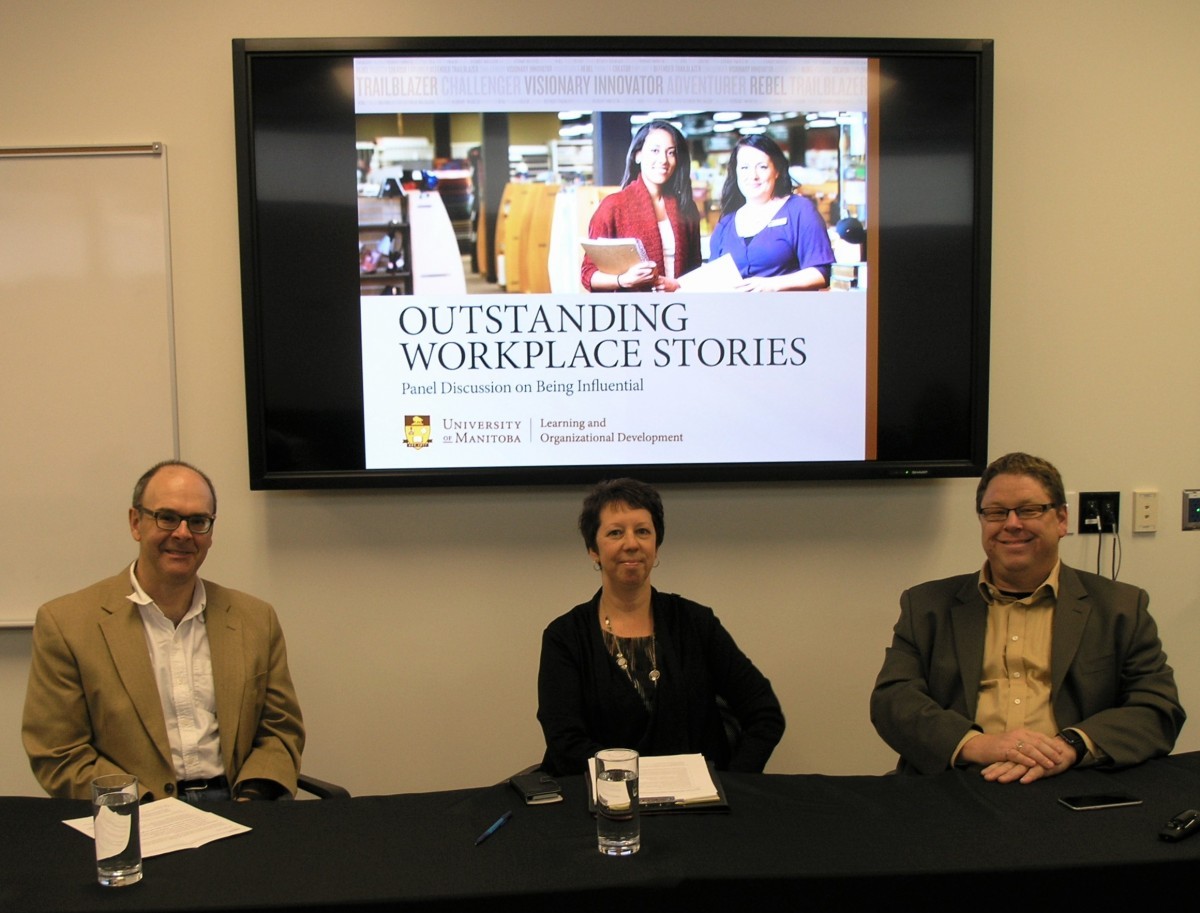
David Ness, Karen Meelker, James Blatz
Outstanding Workplace Stories
Panelists discuss ‘influence in the workplace’
The Outstanding Workplace Stories series consists of noon hour panel discussions that feature members of our university community.
The first event focused on using influence in the workplace. Speakers were: James Blatz, associate vice-president (partnerships) and professor in the Faculty of Engineering; Karen Meelker, access and privacy officer/coordinator; and David Ness, director of Student Counselling Centre and associate professor and counsellor.
Greg Juliano, associate vice-president (human resources), moderated the event, which attracted a diverse audience from across campus.
The audience listened to tips, suggestions and personal reflections — engaging stories about working with others in the workplace.
Several themes emerged.
Know yourself
Blatz said that the key is understanding yourself. “Understand your good habits and your bad habits and how you communicate. It’s important to be self-reflective and see how others perceive you.”
Be open, genuine and represent yourself as well as you can — this will help you be influential, added Ness. He said, “Be aware of what you’re doing — sometimes, this can be tiring and difficult — but ask yourself why you do what you do.” This conscious behaviour will lead to a better understanding of our values, skills and what we have to offer.
Respect others
To be influential is to be respectful of others. “You can’t be a bull in a china shop,” said Meelker. “You can’t be critical of people. Instead, you need to look at and tweak the process, not the person!”
Blatz added, “We all have opinions but we need to disagree respectfully in the face of anything that comes your way. Find common ground.” As the saying goes, seek first to understand, then to be understood.
Develop a collaborative approach
The panelists encouraged listeners to get involved with others. Be curious, ask questions, actively listen and bring some ease and humour to the relationship. Admit when we don’t know the information or when we make a mistake. Meelker’s tip was to link our projects to other departments and the larger strategic direction of the university. She said, “We can’t be insular in our approach.”
Another good suggestion came from Ness, who noted that a positive indicator of any relationship is to ask how we accept the influence. Two parties have to accept that each has a say: each has power, each has influence, he added.
Stay calm!
Conflict happens. When it does, the panelists encouraged listeners to be open to different and challenging styles, rather than run away from conflict. Talk one-on-one with colleagues, they suggested. Try to understand the reasons for the conflict and focus on the issues; don’t make it personal.
A phrase such as “I need to take time to think about these issues” could be helpful, they said. Take a step back, take a breather and de-escalate. Don’t go to the ‘dark side’ of influence with negativity, harassment or bullying; stay on the light side.
Yes, there were jokes about Star Wars, references to philosophers and questions from the audience — an outstanding start to the series!
To read more about the topic of being influential, the panelists recommend the books The 7 Habits of Highly Effective People by Stephen Covey and Emotional Intelligence by Daniel Goleman.
The Outstanding Workplace Stories will take place three to four times a year. If you have ideas for future topics, please contact David Grad, facilitator & programs coordinator, human resources, 204-474-8469, david.grad@umanitoba.ca






